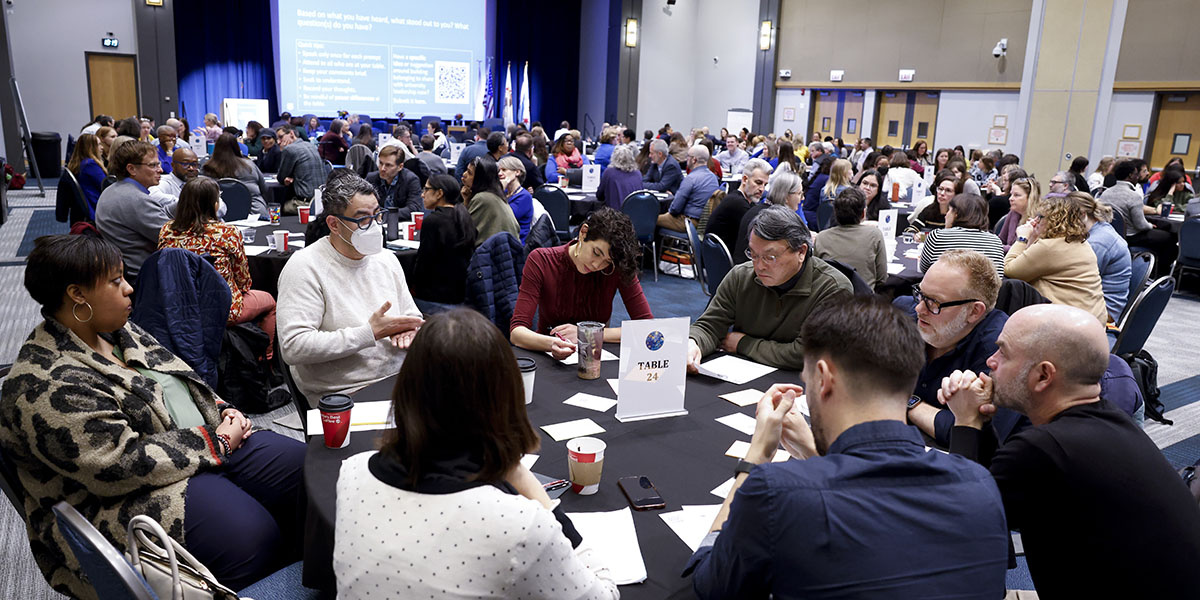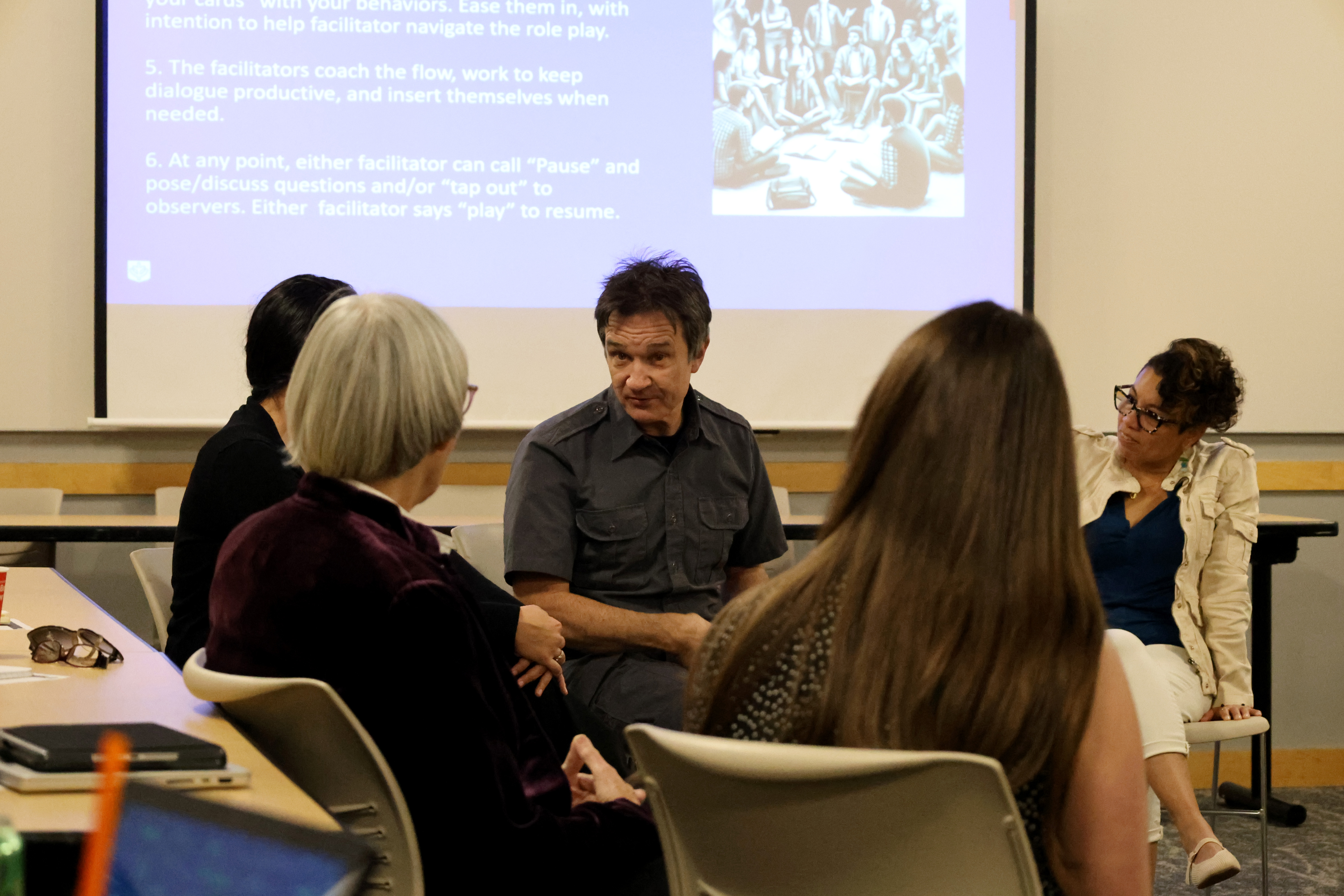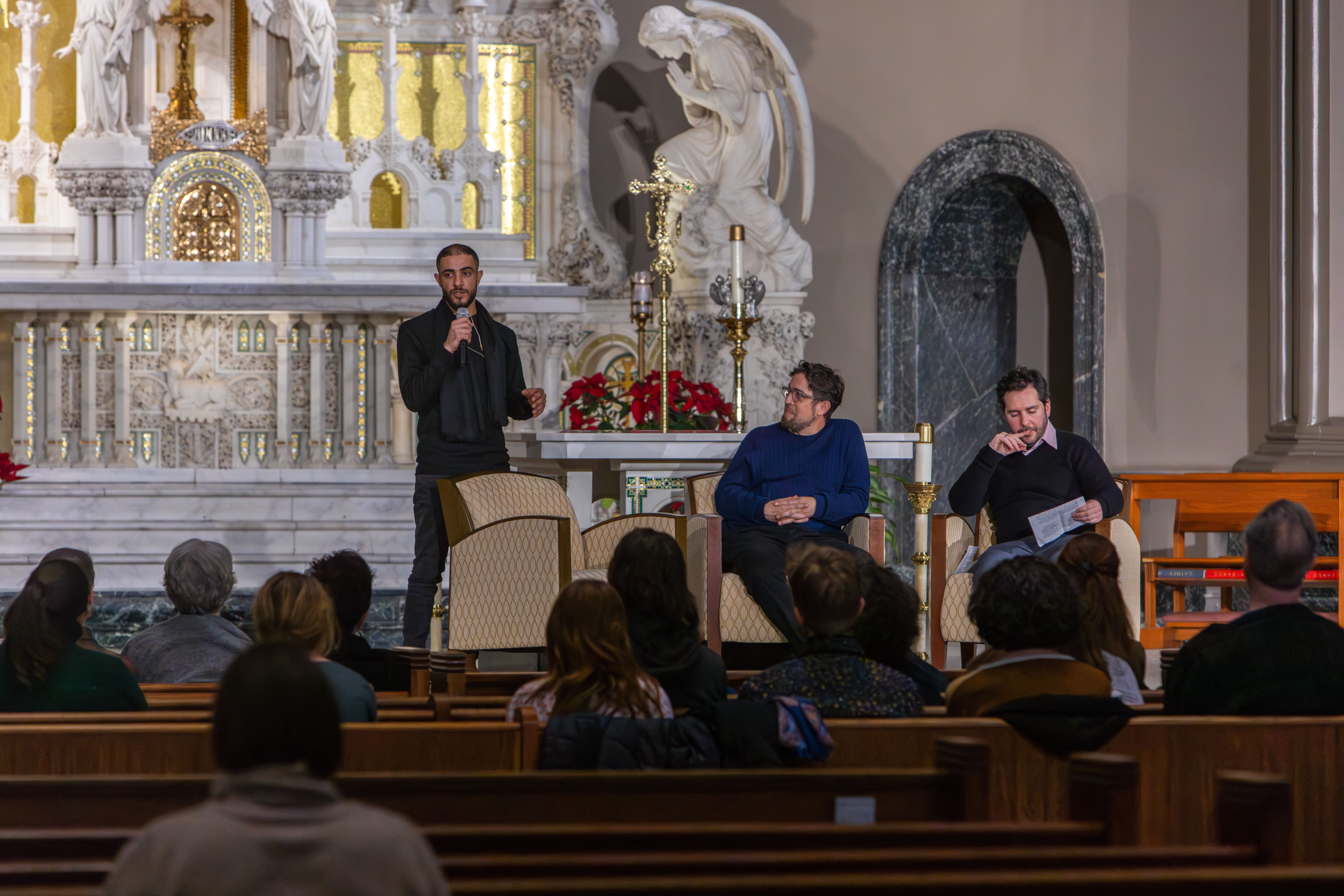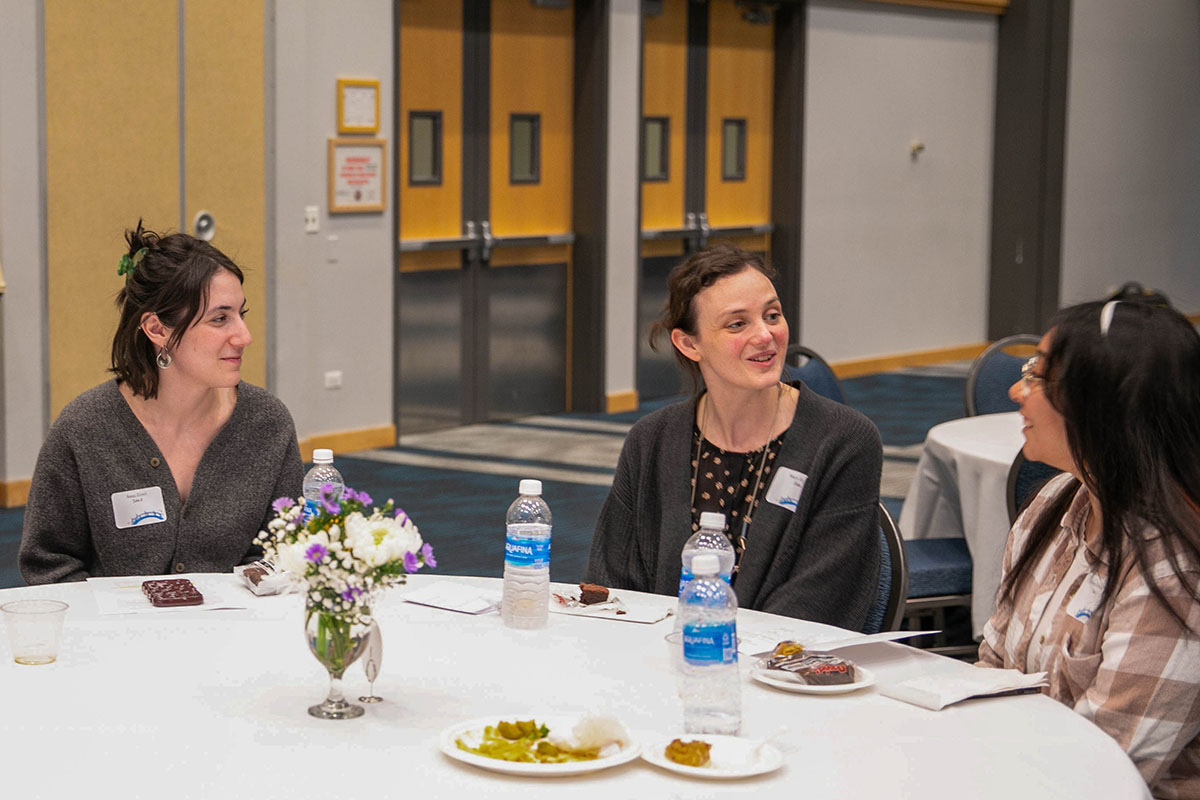
Faculty and staff gathered to explore discuss immigration at a President’s Dialogue Series event in January. (Steve Woltmann/DePaul University)
DePaul established the Dialogue Collaborative last summer to foster a
shared vocabulary and set of dialogic practices across the university.
Hundreds of DePaul faculty, staff and students participated in events hosted
or supported by the collaborative that grappled with immigration, the
conflict in the Middle East, mindfulness, mental health and more. Nearly 60
faculty and staff completed the Dialogue in Action workshops to learn the
principles of facilitating dialogue.
The collaborative has worked hand-in-hand with existing programs to deepen
our community’s engagement with practices of dialogue across campus. There
is still work to be done, but as the academic year ends, members of the
collaborative offer reflections on difficult conversations and
transformative moments from the last year.
The Dialogue Collaborative is now accepting applications for the fall
Dialogue in Action training, which will be Monday afternoons in the fall
quarter. Applications are also open to fund events that promote dialogue.
More information is on the
Dialogue Collaborative’s website.
Dustin Goltz, College of Communication, on a commitment to meaningful
engagement and transformative conversations
Spring Open-Door Discussion: Meeting the Moment at DePaul
I facilitated a dialogue with five faculty members, who occupied a diverse
spectrum of opinions. The care and conviction that fueled that exchange is
exactly what I always believed higher education, and DePaul specifically,
should be striving for. We discussed and processed complex issues and
ideas-in-development in a space that was both critical and curious, both
opinionated and empathetic. We saw a model for who we are and who we hope to
be. That moment stood out to me as a hint, a seed, of what we can
collectively build — a community committed to meaningful engagement and
transformative conversations.
Elissa Foster, College of Communication, on the need for dialogue
Dialogue Collaborative Retreat
 Nearly 60 faculty and staff completed the Dialogue in Action workshops to learn the principles of dialogue. (Will Robson/DePaul Student Photo Agency)
Nearly 60 faculty and staff completed the Dialogue in Action workshops to learn the principles of dialogue. (Will Robson/DePaul Student Photo Agency)At the Dialogue Collaborative Steering Committee retreat in December, we
created a 10-year timeline of local, national and international events that
prompted "a need for dialogue" going back 10 years. We realized there have
been many events and circumstances that disrupted our peace, brought
uncomfortable levels of uncertainty and change, and challenged our
relationships with one another.
We concluded that dialogue is not necessarily going to change those
circumstances. Instead, we can meet those circumstances differently, with a
greater sense of solidarity and inclusiveness, by integrating dialogic
principles and practices into our individual and institutional responses to
them.
Melissa Ockerman, College of Education, on building unity amid
uncertainty and division
Dialogue in Action Training
When I applied in the fall for the winter cohort, I didn’t know the complex
geopolitical environment we would soon be encountering. Arriving at the
first session and meeting my cohort from all across the DePaul community
–faculty, staff, and administrators — felt like kismet. Throughout the
training, we stretched beyond our comfort zones, explored new ways of
expressing ourselves and listened to others, all grounded in our shared
Vincentian values. This coming together--this sense of unity--turned out to
be exactly what I needed in a time of uncertainty and division.
It reminded me of academia at its best – a place to challenge one's
thinking and understanding, to make sense of a rapidly changing world, and
to build a community in a thoughtful and compassionate manner. I finished
the training not only better equipped as an educator, but more hopeful as a
human being.
Georgianna Torres Reyes, Mission and Ministry, on storytelling to build
connection and community
Bridgebuilding
Fellowship
We designed the Bridgebuilding Fellowship to teach 40 of our student
leaders to examine multiple perspectives and learn about themselves and
others in the process. Students shared that inauthentic, aggressive and
one-sided exchanges between people seemed to be the norm in person and
online. They were looking for something different. They described the
Bridgebuilding experience as life giving, restorative, and comfortable.
I was most excited by how students used Bridgebuilding techniques to
navigate difficult situations in their homes, with partners and friend
groups, and in their classrooms. Students emphasized that stories are
important—the stories we tell are expressions of our values and what we
hold most dear.
After the success of the initial year, we will offer the Bridgebuilding
fellowship next year and continue to center deep listening and storytelling
as a means of connection and community building.
 Arab Aramin (left) and Guy Elhanan of the Parents Circle Families Forum shared their powerful journeys from tragic loss to a commitment to reconciliation with DePaul community members. Rafael Tyszblat (right) moderated the conversation. (Keeton Holder/DePaul University)David Wellman, College of Liberal Arts and Social Sciences, on
visualizing a peaceful future together
Arab Aramin (left) and Guy Elhanan of the Parents Circle Families Forum shared their powerful journeys from tragic loss to a commitment to reconciliation with DePaul community members. Rafael Tyszblat (right) moderated the conversation. (Keeton Holder/DePaul University)David Wellman, College of Liberal Arts and Social Sciences, on
visualizing a peaceful future together
Parents
Circle – Families Forum
Many people in our community shared how moved they were to encounter a
Palestinian and an Israeli who clearly loved each other. Underscoring the
power of what Arab and Guy had to say was their description of their
initial desire to kill as many people from the other’s group as possible in
the wake of losing a family member to the conflict. Hearing them recount
their journeys from that moment to committing to dialogue and
reconciliation was extraordinarily powerful. Their time at DePaul was an
unexpected opportunity for many in our community to hear for themselves the
testimonies of people from the region who have chosen to work together to
visualize a future many are unable to see on their own.
Craig Klugman, College of Science and Health, on creating comfortable
silence
Wave 11222
After the Wave 11222 performance on grief and COVID, I led a diverse group
of students and faculty in a discussion. People shared relationships lost
from COVID whether they died or whether they were pushed apart by different
beliefs around conspiracy theories. A faculty participant commented after
that what meant most to her was how comfortable I, as a facilitator, was in
allowing people to sit in silence—to consider what had just been said and
allow space for reflection before someone else spoke. The silence did not
feel awkward but rather permissive, allowing for deeper considerations and
led to a more authentic conversation.
 Bridgebuilding fellows facilitated intergenerational dialogues at a celebration dinner in May. (Lavanya Chetal/DePaul University)Matthew Girson, College of Liberal Arts and Social Sciences, on tools
for dialogue in the classroom
Bridgebuilding fellows facilitated intergenerational dialogues at a celebration dinner in May. (Lavanya Chetal/DePaul University)Matthew Girson, College of Liberal Arts and Social Sciences, on tools
for dialogue in the classroom
Classroom of Lived Civics and Social Contract Theory, and Art, Artists,
and Contemporary Culture
This cross-listed class explores the roles and responsibilities of artists
in societies built on freedoms of speech and expression. For class
discussions, I often adapt a model I learned in Dialogue in Action, in
which students situate themselves along a spectrum of “strongly agree” to
“neutral” to “strongly disagree” in response to a provocative prompt.
Recent prompts included: “Artists from marginalized communities are
obligated to make work that explores the concerns of their particular
marginalized group;” and “old school media and technologies (oil painting,
carved stone or wood, etc.) are less valuable for expressing current
cultural concerns than new technologies.”
After a few turns, students get more comfortable, and their contributions
to the discussion are more nuanced and pertinent. The spectrum of opinions
demonstrates that disagreement and divergent opinions are encouraged and
necessary. They help us understand our own views better as well as others’
views.
Lexa Murphy, College of Communication, on engaging with curiosity and
courage
Bridgebuilding
Fellowship Celebration
At an intergenerational dialogue facilitated by students trained through
the Bridge Builders program, we exchanged perspectives and stories—each
shaped by our unique experiences and identities. The student facilitator
was exceptional, and the conversation was both thoughtful and illuminating.
As I looked around the room, I found myself thinking: Something truly
meaningful is happening here.
We still have work to do. But now, we have a structure. We have a process.
And perhaps most importantly, we have a DePaul community that is
ready—ready to show up, speak out, and engage with courage and curiosity.
Find out more about the Dialogue Collaborative's work on its website.